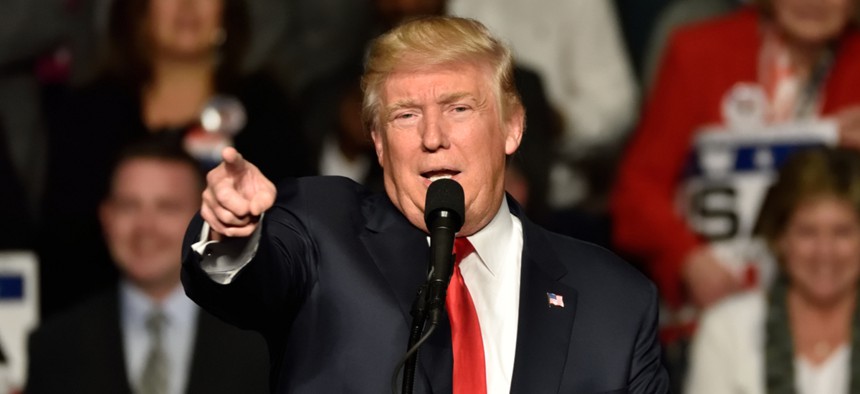
Evan El-Amin / Shutterstock.com
In Tweet, Trump Pledges to Do Two Things the Government Already Does
"Buy American and hire American."
President-elect Donald Trump has repeatedly issued announcements and proposals over Twitter, both during the presidential election and the transition period. Trump has made a habit of issuing 140-character statements, often late at night, that can drive the national conversation.
Incoming White House Press Secretary Sean Spicer has promised that the tweets will continue. “He has this direct pipeline to the American people, where he can talk back and forth,” Spicer recently explained to WPRI, adding that Twitter allows him to “put his thoughts out and hear what they’re thinking in a way that no one’s ever been able to do before.”
The Tweet
My Administration will follow two simple rules: https://t.co/ZWk0j4H8Qy
— Donald J. Trump (@realDonaldTrump) December 29, 2016
The Prompt
Unclear. But bringing jobs back to the United States has been a consistent theme for President-elect Donald Trump. On Wednesday, he took credit for 5,000 jobs from Sprint coming to the United States. That generated an initial flurry of positive headlines, until it became clear that these jobs were part of a Softbank initiative for which he’d already claimed credit, and which had, in any event, been planned prior to his election.
The Context
Existing federal rules already limit civil-service positions to American citizens in almost all circumstances—and congressional appropriations generally bar direct hiring of non-citizens. Similarly, since Herbert Hoover signed the Buy American Act in 1933, the federal government has generally required all federal agencies to prefer American-made goods when making purchases. In practice, that usually means that the lowest foreign bid needs to be 6 percent below the lowest American bid from a large business, 12 percent below an American small business, or 50 percent below a defense-related bid in order to win the contract.
But that’s direct hiring and purchasing. Contracting rules are more nebulous—and as the government has increasingly outsourced functions in pursuit of efficiency, rules requiring American hiring and purchasing haven’t always kept pace. Subsequent federal legislation has imposed some restrictions on transportation projects, some defense purchases, and stimulus-bill projects. Some international trade agreements have also complicated the picture, limiting the government’s ability to put a thumb on the scale in favor of American businesses. But if this is what Trump is driving at, he’s sending mixed signals: Congressional Republicans stripped a buy-American provision out of a water infrastructure bill earlier in December, and despite repeated entreaties from Democrats, Trump declined to weigh in on the debate.
The Response
It’s unclear whether there’s anything remotely new in this pledge, which lacks the sort of specifics necessary to evaluate it in any meaningful way. But then, there’s also Trump’s own record on these issues. Both Donald and Ivanka Trump have attached their names to countless products manufactured abroad, and sold in the United States—and it’s not clear that they have a viable alternative, as The New York Times reports. A CNN investigation recently found that Trump’s businesses have received 1,256 permits for foreign guest workers in the past 15 years, and filed for at least 78 for the coming year. His defenders, though, including Trump himself, have argued that the broken system has necessitated such moves, and that it’s precisely Trump’s knowledge and exploitation of the current system that positions him to fix it. But if he has remedies in mind, he’s been notably short on specifics.






